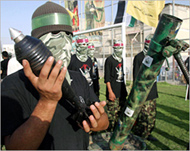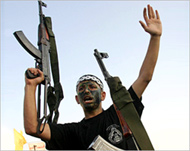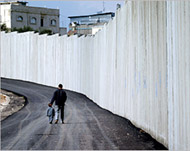Opinion divided on intifada’s outcome
Al-Aqsa Intifada enters its fifth year this week, with a steadily mounting death toll, increasing Israeli repression and little prospect of an end to the conflict.

The past two months have seen an escalation in Israeli military operations in the West Bank and Gaza Strip, resulting in a large number of Palestinian civilian casualties.
According to a report by the Union of Palestinian Medical Relief Committee’s Dr Mustafa Barghuthi, 3335 Palestinians have been killed during the past four years, a startling 82% of whom were civilians. In the same period, 1017 Israeli soldiers, paramilitary settlers and civilians were also killed.
About one in five Palestinian dead was a child, the overwhelming majority of whom were killed with live-ammunition injuries to the upper body. Some 53,000 Palestinians have been injured, 2500 of which have become permanently disabled.
Altered field
The past year has also been marked by regional and domestic changes that have significantly altered the playing field in more ways than one.
This time last year, throngs of Palestinians from across the political spectrum marched through Gaza’s streets to mark the intifada’s third anniversary.
 |
|
The armed resistance continues |
Fast forward one year and, save for a symbolic show of force in the Rafah stadium by al-Aqsa Martyrs Brigades, Gaza’s streets were all but empty.
The Islamic Resistance Group, Hamas, having suffered several blows to its leadership and operations, including the assassination of its spiritual leader Ahmad Yasin and his successor Abd al-Aziz Rantisi, is keeping a low profile. But while the movement has been weakened militarily, its political popularity has grown.
“People want a new model for reform, and they trust Hamas,” says Ghazi Hamad, editor of the Islamic weekly Al-Risala. “Hamas likewise is being forced to take more pragmatic decisions.”
Last year, a Hamas leader confirmed the group’s decision not to participate in any new Palestinian cabinet, telling Aljazeera.net that “national unity does not rely on our participation in the cabinet”.
Growing turmoil
Now Hamas is heavily promoting the voter-registration drive as the first step to reform, and has signalled its intention of running for parliamentary elections.
Gaza Hamas leader Mahmud Zahhar told the London-based Al-Hayat newspaper last week that Hamas would contest legislative and presidential elections – the first time
Hamas has made such a commitment.
“People want a new model for reform, and they trust Hamas. Hamas likewise is being forced to take more pragmatic decisions” Ghazi Hamad, |
Hamas boycotted the 1996 polls for the Palestinian Legislative Council and the presidency of the PA on the grounds that they were not free and democratic and that participation would have legitimised the 1993 Oslo Accords.
This past year has also been marked by increased lawlessness in the Gaza Strip and turmoil within Yasir Arafat’s own Fatah party. The struggle has been characterised by some as generational – Arafat’s old guard versus Muhammad Dahlan’s young guard, and by others as purely power-related.
Fighting for spoils
Salah Abd al-Shafi, political analyst and director of the Gaza Community Mental Health Programme, says: “The young guard is not represented in Fatah decision-making bodies and this is the crux of the problem.
“Dahlan is young guard but he uses old methods. Since the collapse of Abu Mazin, Dahlan has worked on Fatah from the inside. But at the end of the day, Fatah is a tribe and they all go to the head of the tribe.”
 |
|
Proliferation of armed groups is |
Abd al-Shafi adds: “The PA is a facade. There are signs of complete anarchy and chaos and things will only get worse in conjunction with the disengagement plan. Different parties are preparing for the cake, and it’s not a very big cake. Sharon has managed to make it the only game in town.”
Others, such as Hamad, say the problem with Fatah is not between generations but about power.
“I think Dahlan is trying to control Fatah. He depends on support on Fatah and his good relationship with US and Israel. The problem is no one can remove Arafat and he knows that. So he’s moving slowly.”
Land-grab policy
Meanwhile, the Israeli government is tightening its effectively apartheid system like never before, as its notorious separation barrier continues to meander its way through West Bank towns and villages, reducing many of them to open-air detention camps.
The part-wall part-fence structure is annexing large swathes of Palestinian land, depriving thousands of Palestinian farmers of their source of living and effectively killing any realistic prospects for a viable Palestinian state.
|
“There are signs of complete anarchy and chaos and things will only get worse in conjunction with the disengagement plan” |
Earlier this month, the UN human rights investigator, John Dugard, submitted a report to the UN General Assembly that says the separation wall is aimed primarily at grabbing Palestinian land.
“There is no compelling evidence that suicide bombers could not have been as effectively prevented from entering Israel if the wall had been built along the Green Line – the accepted border between Israel and Palestine – or within the Israeli side of the Green Line,” said Dugard.
“The course of the wall clearly indicates that its purpose is to incorporate as many settlers as possible into Israel,” wrote the South African law professor charged with monitoring the West Bank and Gaza Strip by the Geneva-based UN Commission on Human Rights.
“This is borne out by the fact that some 80% of settlers in the West Bank will be included on the Israeli side of the wall,” he said.
Dramatic drop
Israeli officials say the 600km network of razor-tipped fences and concrete walls, of which 200km has been completed, is needed to keep out bombers and that attacks by Palestinians inside Israel have already dropped dramatically as a result of its construction.
 |
|
The separation barrier has added |
The International Court of Justice in The Hague in July adopted a resolution demanding that the barrier be torn down, in line with a non-binding advisory opinion of the court that its route was illegal.
Israel, capitalising on the almost unlimited support of its guardian ally, the United States, has said it will refuse to comply with the court opinion and the assembly resolution. But it has also announced it is reviewing small parts of the barrier’s planned route in response to a June ruling by the High Court of Justice.
In 2000, many people were talking abut the “Lebanonisation” of the Palestinian conflict. The term de jour is “South Africanisation”.
“We are seeing a very new international dynamic that seeks to relate to the issue of the territories, in ways similar to South Africa, and the international community is reacting to that. It’s what I call the ‘South Africanisation’ of the conflict. We are liable to find ourselves branded like South Africa,” said Israeli political analyst Yossi Alpher.”
Apartheid parallels
A report issued by Btselem earlier this month found that Israel restricts Palestinian travel on 41 roads and sections of roads throughout the West Bank, totalling more than 700km of roadway.
The report goes on to note that permits on restricted roads are issued at the sole discretion of the Israeli security establishment.
“Rejections are given verbally and without explanation. According to the head of the civil administration, Brig Gen Ilan Paz. ‘There are no definitive clear criteria for examining requests for a permit’,” the report says.
|
“We are seeing a very new international dynamic that seeks to relate to the issue of the territories, in ways similar to South Africa” Yossi Alpher, |
“By unlawfully discriminating against Palestinians based on their national origin, the Forbidden Roads Regime is reminiscent of the apartheid system that existed in South Africa.”
The Btselem report adds: “The regime violates fundamental principles of international law that are binding on the state of Israel.”
Israel does not deny these apartheid charges. Earlier this month, Israeli Prime Minister Ariel Sharon, who was defending the construction of the West Bank wall, quoted an oft-repeated saying of former Israeli prime minister Golda Meir: “It is not important what the goyem (a derogatory term for non-Jews), say, but what the Jews do.”
Small wonder, then, as Palestinians take stock of al-Aqsa Intifada’s gains and costs on the uprising’s fourth anniversary, an end to the violence and hardships that currently envelop their lives is nowhere to be seen on the horizon.